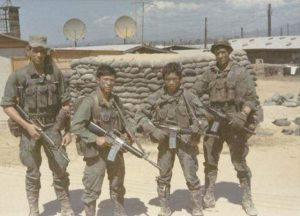

Talk about revolution, civil war, and upheaval is so strong that around 60% of Americans think it is possible to likely to occur soon. But while it may be true we need to rethink and reinvent society in a revolutionary manner, to reverse the war on freedom by the corrupt ruling class, the violence, coercion, and alienation that attend most revolutions aren’t worth the achievement of their goals.
If we juxtapose our concept of a peaceful revolution within, based on the UPDR Ideals (Unity in diversity, Popular sovereignty, Democratic equality, and Rule of law) with most ideological revolutions we see on one hand, the Upadarian (UPDRian), peace and harmony with tolerance and love, and, on the other hand, oppression, fear, and upheaval.
The Upadarian (UPDR) Revolution is peaceful change from within through freewill participation, it has little to do with politics beyond demanding politics remove its coercive control from the realms of faith, family, culture, and freewill participatory community.
The Upadarian Revolution envisions the devolution of political and corporate power and wealth from the center and top of society to private and local structures and institutions based mostly or wholly on freewill participation. In that regard, while adherents of this Revolution will gather and connect based on its shared ideals and principles, its effects could extend way beyond its practitioners.
What we call “The Upadarian Revolution” is itself a bold departure from what most people think of when they talk about revolution. Most revolutions tend toward three things: violence, compulsion, and alienation. They are conducted in violence. People who are in lockstep are compelled to adhere to their edicts. Everyone who opposes their underlying ideology is alienated from the group conducting the revolution. But the whole concept of the Upadarian Revolution is itself revolutionary: it does not in any way use violence, no compulsion is applied to anyone, and those who don’t agree with its ideas are not considered alienated from those who do.
If this kind of revolution is successful, there will be large-scale structures and global institutions that meet people’s needs, but everyone who participates in and benefits from this revolution will do so willingly and through informed consent. The chief problem with most ideologies is that they try to create structures and institutions based on coercion and force and they alienate people who don’t agree with their principles or goals. They almost claim that in order to acheive their aims, usually bogeyman fears addressed or utopian promises provided, they must be followed by everyone, without exception.
The effects of the Upadarian Revolution would be unilaterally created alternative sociocultural and socioeconomic structures and institutions, perhaps even whole private distributed cities and safe havens, that reflect shared ideals, principles, and practices based on Christian beliefs, values, and convictions. Beyond participants and adherents, such a revolution would also result in a more formal recognition and accommodation of private alternative forms of sociocultural and socioeconomic autonomy for groups of people who are drawn together through mutual consensus and freewill participation alone.
Too many “revolutions” have no value unless and until they dominate a landscape and create their own political, sociocultural, and socioeconomic hierarchies that dominate the lives of everyone. In other words, they don’t offer much of anything until everyone within a given land is under their rule. But, at the same time, even when they gain dominance, they tend to fail miserably: they don’t succeed in ending the bogeyman fears nor in fulfilling any of their utopian promises.
Our revolution is unilateral and peaceful. It is something one practices, it isn’t something one imposes. Even within unfree and dysfunctional societies, people who start with our four core ideals and use the other principles and practices will tend toward being more free and prosperous than their neighbors, all without needing the permission, much less the submission, of their neighbors. To be able to create positive and beneficial change without worrying about the opinions of others or who wins an election is a truly revolutionary idea whose time is now.
We cannot emphasize enough how our concept of revolution is such a departure from the previous concepts of revolution as a forceful change of rules and rulers over everyone, whether they like it or not. Being jingoistic, divisive, and hateful toward the “other” who doesn’t meet your expectations will not solve our problems in a just manner that honors the laws and nature of God!
People who come to embrace this new way of conducting a revolution within their own lives, relationships, associations, and communities on the basis of freewill participation alone will experience the benefits of such a revolution even if society around them continues its spiritual and moral decline into depraved corruption.
There is no “otherfying” your neighbors, no division or intolerance, and no hatred of others within our concept of revolution as we are seeing emerge on the left and right. If your version of society demands you demonize dissenters or otherfy your neighbors, then it’s more of the same top-down centralized control by the few over the many. We simply aren’t interested in otherying our neighbors or assuming everyone who doesn’t embrace our ideals and the such is somehow not as good as us. We reject the “us versus them” narrative.
One chooses the Upadarian Revolution as a pathway to fulfillment, to freedom and prosperity, and to actualizing God’s scroll of destiny and purpose for their lives, that which is God’s best for their lives. Beyond sharing this and urging others to consider this, the practitioners of our revolution don’t otherfy their neighbors or in any way pursue a path of coercion or control over anyone else.
We don’t need these top-down, coercive revolutions that use violence and that alienate people from each other.







